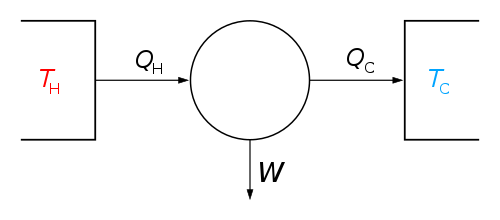Scuderi cycle
A Scuderi cycle is a thermodynamic cycle that is constructed out of the following series of thermodynamic processes:[1]
- A-B and C-D (TOP and BOTTOM of the loop): a pair of quasi-parallel adiabatic processes
- D-A (LEFT side of the loop): a positively sloped, increasing pressure, increasing volume process
- B-C (RIGHT side of the loop): an isochoric process
| Thermodynamics | ||||||||||||
|---|---|---|---|---|---|---|---|---|---|---|---|---|
 The classical Carnot heat engine | ||||||||||||
|
||||||||||||
| ||||||||||||
The adiabatic processes are impermeable to heat: heat flows rapidly into the loop through the left expanding process, resulting in increasing pressure while volume is increasing; some of it flows back out through the right depressurizing process; the remaining heat does the work.
See also
References
- "Scuderi Group Will Present Results from Split-Cycle Prototype Testing at IAA". Green Car Congress. 2009-09-08. Retrieved 2010-09-22.
This article is issued from Wikipedia. The text is licensed under Creative Commons - Attribution - Sharealike. Additional terms may apply for the media files.